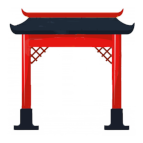| ||||||||||||||||||||||||||||||||||||||
| 古 |
|
 Hanzi-Trainer |
||||||||||||||||||||||||||||||||||||
| ||||||||||||||||||||||||||||||||||||||
Meaning
| ||||||||||||||||||||||||||||||||||||||
Pronunciation
|
gǔ | |||||||||||||||||||||||||||||||||||||
Explanation |
Ten 十 and mouth 口. (古 was derived from the image of a skull, therefore the meaning of old. Helpful is also the image of a grave mound) | |||||||||||||||||||||||||||||||||||||
|
Below the tomb stone is lying the 'old'. | |||||||||||||||||||||||||||||||||||||
Radicals
| ||||||||||||||||||||||||||||||||||||||
Vocabulary
| ||||||||||||||||||||||||||||||||||||||
|
List of the characters | List of the radicals | ||||||||||||||||||||||||||||||||||||||
| ||||||||